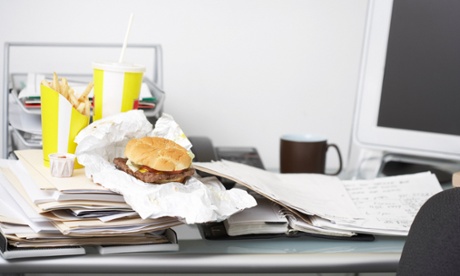
For many of us the office has become our dining room, with at least one-third of our daily calories consumed while at work. The problem is that most of it is not what nutritionists would describe as a healthy, balanced meal.
We know that fruit, vegetables and water are good for us, yet we still reach for an espresso and a sugar-coated pastry for a boost. This is in the context of wider societal concerns over diets high in sugar and rising trends of obesity and diabetes. These are also points of concern for employers, who recognise that the health of their employees influences the health of their businesses.
At Bloomberg’s New York offices, where free food has long been an employee benefit, attempts to influence behaviours are being trialled, such as placing healthy choices at eye-level and the not-so-healthy choices down at the bottom, “which makes it a little bit of a barrier”, says the company’s sustainability manager, Lee Ballin. The size of cups and cereal bowls have also been reduced. “We recently started [offering] naturally flavoured waters and made them look delicious and enticing. It looks like you’re having pink lemonade, but you’re really having pomegranate-flavoured water ... even I still fall for it.”
Other companies prefer more direct techniques. Staff at Italian firm Technogym’s headquarters are incentivised to be healthy with “move points”, which are ranked on digital league tables and converted into prizes. The canteen food lists the number of calories and the number of points it correlates to, and a “mywellness key” measures each employee’s daily activity, constantly downloaded onto the cloud. A Technogym spokesperson says it advises other firms, including Rolls-Royce and Merrill Lynch, on how to apply similar policies.
However, Professor Carl Cederström, co-author of 2014 book The Wellness Syndrome, argues that workplace wellness and healthy eating programmes can blur the line between life and work. “There are examples of teachers in Chicago who were forced to share their biometrical data, such as their BMI, what they eat and how much they exercise. There is a state-owned water company in Sweden, Kalmar Vatten, where employees are expected to work out twice a week, during work hours. Whether they exercise or not is now part of their job,” he says. According to Cederström, the failure not to conform has become a stigma.
Patrick Watt, corporate director at Bupa UK, says that while “it’s encouraging that businesses are increasingly recognising their responsibility to help keep their people healthy and well, it’s also important that they don’t forget the basics: encouraging people to take regular breaks away from their desk and maintain a healthy work-life balance is vital to ensuring people have time to relax and recharge.”
Bupa estimates that more than six million UK employees do not leave their desks for lunch and only 13% manage to get away for a full hour, impacting employee energy and productivity levels and costing UK business £50m a day.
One organisation that takes the health and diet of its employees extremely seriously is Nasa, even going as far as thinking through the packaging of the food for its astronauts.
Nasa’s captive diners could be fed the optimum nutritional balance, but while health is a priority, astronauts also receive treats you wouldn’t find in any wellbeing manual, from M&Ms to squeezy cheese.
“The psychological impact of food has the quickest impact and response on our crew members,” explained Nasa food scientist Vickie Kloeris at the recent Sodexo Quality of Life conference. Her team has designed food packages for astronauts staying on the International Space Station (ISS) since 1995. “The nutritional [impact] is more long-term ... Military research shows that if military folks get menu fatigue, they will eat enough to survive, but they won’t eat enough to thrive.” Kloeris adds that a specially designed espresso machine is soon to be delivered to the ISS.
As the science of food and nutrition advances, the message remains much the same: everything in moderation. If workplace wellness programmes help people to moderate, without dictating, then benefits can be achieved. “The tendency is that we like to cure the symptoms without asking the deeper questions about work-life, overtime, more stress and anxiety”, warns Cederström. The challenge for workplace wellbeing is to ensure this list is addressed holistically, not added to.
The food hub is funded by the Irish Food Board. All content is editorially independent except for pieces labelled “brought to you by”. Find out more here.
Join the community of sustainability professionals and experts. Become a GSB member to get more stories like this direct to your inbox

